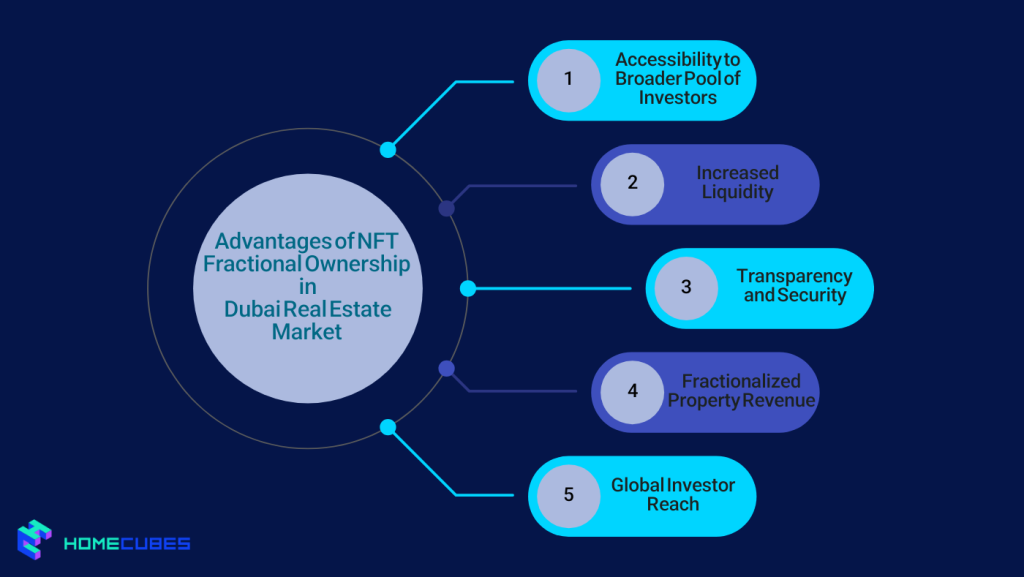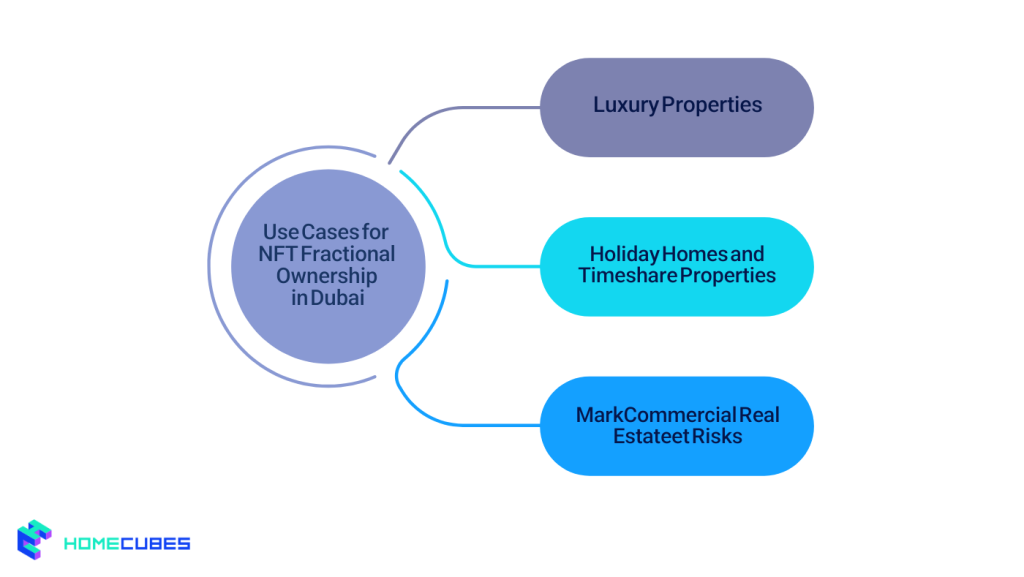

Dubai’s real estate market has always been synonymous with luxury, investment opportunities, and rapid development. However, despite the vast growth and potential, property ownership remains out of reach for many individuals due to high entry costs. Enter NFT fractional ownership, a ground-breaking concept that is aims to redefine the landscape of property investment in Dubai.
As part of our commitment to ensuring the sustained progress of government initiatives that reinforce Dubai’s global leadership, I met with Marwan bin Ghalita, Director General of the Dubai Land Department, to review the strategic projects of the Dubai Real Estate Sector Strategy… pic.twitter.com/2g0yodwMmS
— Hamdan bin Mohammed (@HamdanMohammed) November 25, 2024
NFT fractional ownership combines two powerful innovations. The combination of Non-Fungible Tokens (NFTs) and fractional ownership allows multiple investors to collectively own a share of a property. By doing so, it makes high-value real estate assets accessible to a wider pool of investors, unlocking new possibilities for both buyers and developers. In a city like Dubai, known for its forward-thinking approach to technology and business, NFT fractional ownership could have far-reaching implications for the future of real estate.
What is NFT Fractional Ownership?
NFT fractional ownership is an innovative approach that allows multiple individuals to invest in high-value properties by owning fractions of the property through Non-Fungible Tokens (NFTs). In traditional fractional ownership models, investors buy shares in a property. However, NFTs bring a unique twist. Each fraction or share of the property is tokenized as an NFT, a unique digital asset that represents ownership of a specific portion of the property.
NFTs or tokenized tangible assets are based on blockchain technology, which provides transparency, security, and immutability. The utilization of blockchain in real estate ensures that every transaction related to the property is recorded on a public ledger, making it easy to verify ownership and track any changes in the asset. Unlike traditional shares or certificates of ownership, NFTs are indivisible, unique, and easily tradable on various platforms, allowing for increased liquidity in the real estate market.
How NFT Fractional Ownership Works
In traditional property investment models, buying a property involves significant capital upfront. NFT fractional ownership makes property investment more accessible by dividing a property into multiple fractions, each represented by an NFT. Investors can purchase as little as a fraction of a percent of the property, depending on the number of NFTs created for that property.
Here’s how it works in more detail:
Property Tokenization
NFTs come to existence through property tokenization. Each NFT represents a fractional share of the property. These tokens are then available for sale to investors.
Smart Contracts
Smart contracts, which are self-executing agreements written into code on the blockchain, govern the terms of the property ownership. These contracts can automatically manage payments, rental income distribution, and ownership transfer.
Ownership Verification
Once an investor purchases an NFT, they have verifiable, on-chain proof of ownership. The blockchain ensures transparency, preventing fraud or ownership disputes.
Revenue Sharing
The property can generate income through rentals, capital appreciation, or other means. This revenue is automatically distributed to NFT holders based on the number of tokens they own, via smart contracts.
Liquidity and Transferability
Unlike traditional fractional ownership models, NFTs are tradable on blockchain marketplaces. If an investor wants to exit, they can sell their NFT to other potential buyers without the need for intermediaries, providing liquidity to the traditionally illiquid real estate market.
Advantages of NFT Fractional Ownership in Dubai’s Real Estate Market

1. Accessibility to a Broader Pool of Investors
The high cost of property in Dubai has long been a barrier to entry for many potential investors. NFT fractional ownership allows multiple people to own a fraction of a high-value property, significantly lowering the investment threshold. Instead of needing millions of dollars, investors can buy a small percentage of a property for a much more affordable price. This democratizes access to Dubai’s high-end real estate market, enabling global investors to participate with relatively small capital.
2. Increased Liquidity
One of the key issues with traditional real estate investment is liquidity. Real estate is generally illiquid, meaning it can take months or even years to sell a property and realize a return on investment. With NFT fractional ownership, investors can buy or sell their share of the property on secondary markets, much like other digital assets. This creates a far more liquid market, where investors can exit their position when they choose, without waiting for a buyer for the entire property.
3. Transparency and Security
Blockchain technology underpins NFT fractional ownership, ensuring transparency and security. The ownership of each NFT is recorded on the blockchain, providing a tamper-proof record of who owns what portion of the property. This eliminates the potential for fraud, mismanagement, or disputes about ownership. Every transaction is publicly visible on the blockchain, providing a high level of trust and accountability that traditional property investment models cannot match. By providing transparency and security the role of NFT in property rights protection in Dubai is considerable.
4. Fractionalized Property Revenue
With NFT fractional ownership, revenue generated by the property, such as rental income, is distributable among NFT holders automatically using smart contracts. This means that investors don’t need to manage the property or deal with complicated paperwork to receive their share of the income. Smart contracts handle the distribution efficiently, ensuring of fair compensation for all stakeholders on time.
5. Global Investor Reach
Dubai is a global hub for investment, attracting people from all over the world. NFT fractional ownership allows global investors to access the Dubai real estate market without the need to navigate local regulations, open local bank accounts, or manage foreign currency exchange. As long as they have access to cryptocurrency or a digital wallet, investors from anywhere in the world can participate in Dubai’s property market through NFTs, making it more attractive to a broader audience.
Use Cases for NFT Fractional Ownership in Dubai

1. Luxury Properties
Dubai is famous for its luxury real estate, including iconic properties like the Burj Khalifa, Palm Jumeirah, and exclusive beachfront villas. Many of these properties are priced well beyond the budget of most individual investors. NFT fractional ownership opens up opportunities for a wide range of investors to purchase fractional shares in these luxury assets. Whether it’s owning a portion of a luxury apartment or a prime commercial property, NFT fractional ownership allows investors to diversify their portfolios by gaining exposure to high-value Dubai real estate.
2. Holiday Homes and Timeshare Properties
Dubai is a top global tourist destination, and many investors are interested in owning vacation homes or rental properties to capitalize on the tourism market. That might be the main reason for the growing role of tokenization in the Dubai vacation rental market. NFT fractional ownership can be particularly beneficial in this context. For example, investors could buy fractions of a luxury holiday home and receive a share of the rental income generated when the property is leased out to tourists. This makes it easier for investors to benefit from Dubai’s booming tourism sector without the burden of full ownership and property management.
3. Commercial Real Estate
Dubai’s commercial real estate market is also thriving, with offices, retail spaces, and hospitality properties in high demand. Through NFT fractional ownership, multiple investors can collectively own shares in commercial properties, sharing the rental income and capital appreciation. This model lowers the entry barrier for investors who are interested in Dubai’s commercial real estate sector but cannot afford to purchase entire properties outright.
Challenges to Consider
While NFT fractional ownership in Dubai offers significant advantages, it is not without its challenges. The regulatory landscape for blockchain-based real estate transactions is still evolving in many regions, including Dubai. Legal frameworks need to be developed to recognize and regulate fractional ownership through NFTs.
Additionally, the volatility of cryptocurrency markets can introduce risks for investors. While the real estate market in Dubai is generally stable, fluctuations in the value of the cryptocurrencies used to purchase NFTs could impact the value of the investor’s stake.
Bottomline
NFT fractional ownership represents a bold new frontier for property investment in Dubai, a city already known for embracing technological advancements. By combining blockchain technology with fractional ownership models, NFTs can make real estate investment more accessible, transparent, and liquid. Whether it’s luxury homes, commercial properties, or holiday rentals, NFT fractional ownership offers exciting possibilities for investors and developers alike.
As Dubai continues to position itself as a global leader in real estate innovation, NFT fractional ownership has the potential to reshape the way people invest in property, creating a more inclusive, efficient, and dynamic market for all.
In such a growing market, Homecubes has developed a sophisticated property fractional ownership in full compliance with UAE regulation on asset tokenization. Contact us with confidence for detailed information on our lucrative fractional investment opportunities in the Dubai real estate market.










